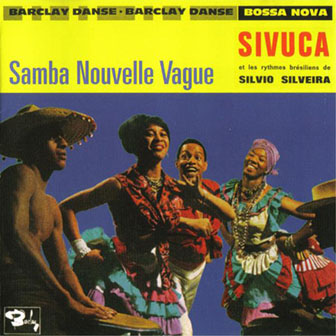Samba Nouvelle Vague
Sivuca
℗ 1962
℗ 2012 barin99.livejournal.com 765 872

Noted composer, arranger, and accordionist, Sivuca developed a very successful international solo career after having performed with Baden Powell, Toots Thielemans, Chiquinho do Acordeon, Radames Gnattali, Rosinha de Valenca, Waldir Azevedo, Harry Belafonte, and Miriam Makeba, among many others. As a composer, Sivuca wrote the classics 'Adeus, Maria Fulo' (with Humberto Teixeira), 'Joao e Maria' (with Chico Buarque), and had hits with 'Feira de Mangaio' (with his wife Glorinha Gadelha) recorded by Clara Nunes and 'No Tempo dos Quintais' (with Paulo Tapajos). His partners were artists such as Paulinho Tapajos, Paulo Cesar Pinheiro, Luis Bandeira, Armandinho, Hermeto Pascoal, and Chiquinho do Acordeon. Having taken the accordion very early, at nine Sivuca was already playing for a living in fairs and parties. Six years later, he moved to Recife (Pernambuco), where he debuted at the Radio Guararapes. Hired by the Radio Clube de Pernambuco, Sivuca performed in that outing for three years, both in solo acts and as a member of its regional, switching to Radio Jornal do Comercio in 1948. There he learned music theory with the other musicians of the orchestra and then with its newly appointed conductor, Guerra-Peixe. Carmelia Alves, touring Recife in 1949, discovered him and brought him to Sao Paulo, where he backed her up in a recording that same year. In Sao Paulo, Sivuca was hired by the Radio Record and in 1951, he recorded his first album with the choros 'Tico-Tico no Fuba' (Zequinha de Abreu) and 'Carioquinha no Flamengo' (Waldir Azevedo/Bonfiglio de Oliveira). With the international success enjoyed by the baiao in the '50s and the consequent need of good Northeastern music and instrument players, Sivuca's career gathered momentum as he was the right man in the right moment and place. Still in 1951, he accompanied Carmelia Alves on the medley 'No Mundo do Baiao' and recorded his second solo album with the frevo 'Frevo dos Vassourinhas Numero 1' (Matias da Rocha) and the baiao 'Sivuca no Baiao' (Luiz Gonzaga/Humberto Teixeira). In the next year, he started to record originals with the choros 'Entardecendo' and 'Choro Baixo' (with Luis Bandeira), recording in the next year his baiao 'Feijoada.' At the same time, Sivuca realized solo performances in Sao Paulo backed by his regional and also by the orchestras led by Herve Cordovil and Gabriel Migliori, while he continued to perform on the Radio Jornal do Comercio do Recife. In 1955, he was hired by the powerful nationwide network Diarios Associados to work at the Radio and TV Tupi (Rio de Janeiro), where he stayed until four years later. In 1958, as a member of Os Brasileiros, he toured Europe in one of the Brazilian Music Caravans sponsored by the Brazilian government. The group, led by conductor Guio de Morais, performed a three-month season with the Trio Iraquita, Abel Ferreira, Pernambuco, and Dimas. In 1959, fired by Tupi for having participated in a strike for better salaries, Sivuca moved to Europe where he performed for three months with the group Brasilia Ritmos (which had Waldir Azevedo as a member). After that, he was hired by a Portuguese club and then settled in Paris, France, where he lived until 1964, recording in 1962 through Barclay the LP Rendez-Vous a Rio. Having returned to Recife in 1964, in the same year he went to the U.S. with Carmen Costa, where he was invited by Miriam Makeba's husband/manager to join her group as a guitarist. Holding that position for four years, Sivuca became the director of Makeba's group and toured Africa, Europe, Asia, and America. Returning to New York in 1969, Sivuca directed the music and performed in the musical Joy, which opened in 1970. Having performed in San Francisco and Chicago, in live shows and on TV, in 1971 Sivuca was invited by Belafonte to join his group. Staying with Belafonte until 1975 as his guitarist, keyboardist, and arranger, Sivuca at the same time recorded solo albums in the U.S., including the praised Live at the Village Gate, where he interpreted 'Adeus Maria Fulo.' Returning to Brazil in 1977, he performed a live recorded show with Rosinha de Valenca at the Teatro Joao Caetano (Rio de Janeiro), released as the LP Sivuca e Rosinha de Valenca. In 1978, he had another hit with 'Joao e Maria' in the recording realized by Chico Buarque and his sister Miucha. Six years later, Sivuca recorded another memorable LP, this time shared with Chiquinho do Acordeon and with the participation of Radames Gnattali, Sivuca e Chiquinho. In the next year, he recorded three albums in Sweden, with Chiko's Bar/Sivuca e Toots Thielemans deserving especial mention. During the '80s and '90s, his schedule slowed somewhat, although he recorded an important LP with Rildo Hora in 1987 (Sanfona e Realejo) and performed with Baden Powell in Paris in 1997. |
- 1. Samba de Uma Nota So [02:44]
- 2. Fala, Amor [02:47]
- 3. Maria Ninguem [02:33]
- 4. Rosinha [02:17]
- 5. Sempre [03:05]
- 6. Rapaz de Bem [03:07]
- 7. Nao Me Diga Adeus [02:34]
- 8. Ho-Ba-La-La [02:20]
- 9. Recado [02:47]
- 10. Deixa o Breque Pra Mim [02:59]
- 11. Desafinado [02:46]
- 12. Rancho Fundo [02:06]
- 13. Flor de Abacate [02:23]
- 14. E Luxo So [02:13]
- 15. Tico-Tico No Fuba [02:05]
- 16. Bahia [02:57]
- 17. Feitico da Vila [02:56]
- 18. Fita Amarela [02:25]
- 19. Apanhei-Te Cavaquinho [02:01]
- 20. Copacabana [02:20]
- 21. Homenagem a Vehla Guarda [02:54]
Участие в альбоме:
- Sivuca: accordion, guitar, piano, vocals
- Nestor Campos: guitar
- Ney De Castro: drums
- Claude Civelli: flute
- Marcel Hrasko: bass-clarinet
- Alphonse Masselier: double bass
- Guy Pedersen: double bass
- Dimas Sedicas: percussion
- Silvio Silveira: percussion
- Bill Tamper: trombone